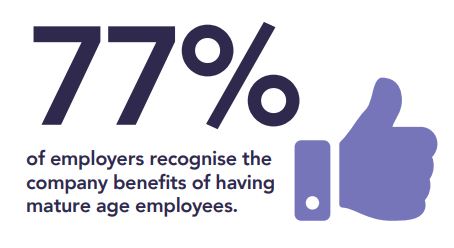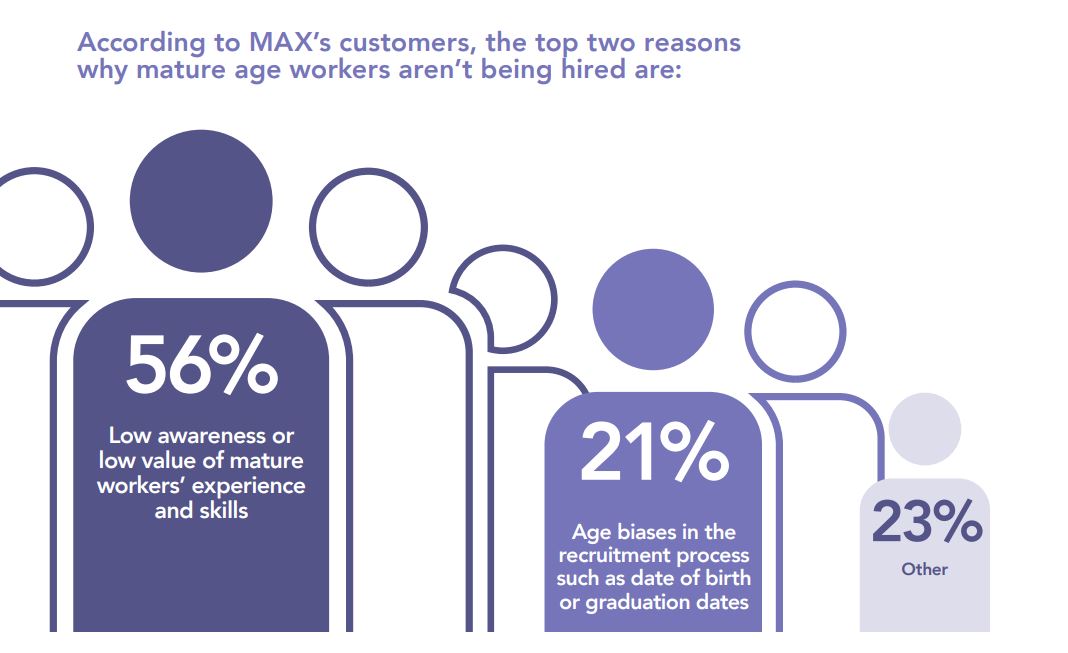03 Sep New research finds 30% of Australian employers are reluctant to hire older workers despite outperformance of younger peers in essential workplace skills
This week, alongside Australia’s largest employment provider, MAX Solutions, we have fueled a deeply important conversation about mature age job candidates in Australia, launching the MAX Solutions Breaking the Age Barrier Report.
The report aims to help employers and job candidates understand and overcome the barriers older Australians face in the job hunt and at work. The key takeaway being that any older Australian who wants to work and has valuable skills must be supported in finding work, both for their individual wellbeing and Australia’s economy as our population ages.
Fiona Lamb, MAX Solution’s General Manager Employment Services, MAX customer Martin Smith, Ian Yates, Chief Executive of the Council on the Ageing Australia (COTA) and Jacqueline King from MAX Solutions Batemans Bay, spoke to Anna Patty, workplace editor at the Sydney Morning Herald, to raise this important topic – reaching a whopping potential audience of 15.4 million readers across Australia with the story syndicated across Nine newspapers.
Please see a copy of the media release that accompanied the report below:
New research finds 30% of Australian employers are reluctant to hire older workers despite outperformance of younger peers in essential workplace skills
Sydney, 3 September 2021 – New research by Australia’s largest employment services provider, MAX Solutions, has revealed that 30% of employers are reluctant to hire older workers, despite employers identifying a range of essential workplace skills at which older workers tend to excel compared with younger peers.
The Breaking the Age Barrier Report highlights that as our population ages, ensuring the wellbeing and success of older Australians in the workforce is a crucial challenge for the nation as mature-age jobseekers remain over-represented in those looking for work. People aged 55-64 are the largest unemployed group currently on JobSeeker payments[1]. According to the Australian Bureau of Statistics[2], Australians aged 50-64 make up approximately 17.8% of our population, yet they represent 28% of MAX’s unemployment figures[3].
Fiona Lamb, Executive General Manager of Employment Services at MAX Solutions, said: “Despite ongoing reluctance amongst some employers to hire older workers, 77% of employers believe that mature-age employees benefit their place of work and bring valuable skills and traits to the company.
“One of the biggest challenges amongst mature-age Australians is a lack of self-confidence. We often see older candidates being too modest at the interview stage or uncertain about how their previous skills are transferable to a different industry or position. However, we know first-hand that they bring significant value to the workplace and are highly adaptable.”
In fact, mature-age workers were identified by employers as being more adept at a range of vital workplace skills compared with their younger peers, including dispute resolution (57%), mediation (55%) and managing others (55%).
‘Wealth of experience’ is considered the main benefit of mature-age workers by 60% of employers, followed by ‘maturity and stability’ (48%), and ‘reliability and dependability’ (43%).
Whilst digital literacy is often perceived as a challenge for mature-age workers, 7 in 10 employers are of the opinion that older workers learn new digital and IT skills as quickly or more quickly than they would expect. Employers should make hiring decisions on the assumption that mature age workers will most likely have, or be able to develop, the necessary skills in this area.
In order to capitalise on the benefits that mature age and older workers can bring to a workplace, employers must move their actions from policy to practice. While 65% of employers surveyed have a diversity and inclusion policy, only 40% are actively taking steps to attract and retain older workers.
Ian Yates, Chief Executive at The Council on the Ageing (COTA), said: “The 62% of employers surveyed who have or are considering changes to accommodate older workers show that small actions can make a vast improvement in finding and retaining the right workforce.”
Employers believe the biggest challenge for older workers is fixed ideas about ways of working (61%), while job candidates believe employers have low awareness or low value of mature workers’ experience and skills (56%).
Martin Smith of Bateman’s Bay, aged 56, had a history of low-skilled work and long periods of unemployment. Supported by MAX Solutions, Martin achieved welding and powder coating qualifications and is now a highly skilled and valued team member working at manufacturing company Vision Railings and Glass.
Commenting on what finding a job means to him, Martin said: “It’s given me normality. I have a nice home. I recently bought a car. One thing I found when I didn’t have a job was when someone walks up to you on the street and says ‘What do you do for a living?’ and you say ‘Oh, I’m unemployed,’ you feel like crap. Just having a job makes you feel about six inches taller. Normality is a big thing. Having food on the table, money in my pocket – that’s a big bonus.”
The research consisted of a survey of 500 Australian employers (conducted by independent research provider Decibel) and a survey of MAX Solutions’ own mature-age customers, conducted by MAX.




